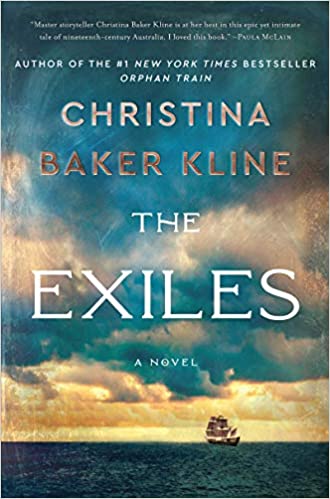“Running a finger along the shells of her necklace, Mathinna remembered her mother placing it in her hands. ‘Every person you’ve ever cared about, and every place you’ve ever loved, is one of these shells. You’re thread ties them together,’ she’d said, touching Mathinna’s cheek.”
“‘When you cut down a tree, you can tell how old it is by the rings inside. The more rings, the sturdier the tree. So … I imagine I’m a tree. And every moment that mattered to me, or person I loved, is a ring.’ She put the flat of her hand on her chest. ‘All of them here. Keeping me strong.'”
********
The gift of a necklace from a mother to her daughter, words from a father to his daughter about the rings of a tree — both offer the same lesson: We live making our story by remembering those that came before us giving us theirs.
 Two daughters — bookends of opposites — are in a land under British rule, a place — Australia — where the British government can send those it deems undesirable. It is 1840, and these two daughters and their incredible journey lie at the heart of Christina Baker Kline’s new novel, The Exiles.
Two daughters — bookends of opposites — are in a land under British rule, a place — Australia — where the British government can send those it deems undesirable. It is 1840, and these two daughters and their incredible journey lie at the heart of Christina Baker Kline’s new novel, The Exiles.
Following the success of her previous novels Orphan Train and A Piece of the World, Kline again proves she is not only an adept storyteller but also a writer determined to immerse herself in her subject. In this new work, that means capturing a period in time when Australia is trying to find itself while under British rule.
With Australia’s land and islands now used as prisons, and English royalty taking land, animals and even people to satisfy curiosity, Kline has created a real glimpse into a past many would like to forget.
Mathinna is a curious child imbued with a forever sense of wonder. She is also the orphaned chieftain’s daughter of the Palawa people. With their tribal land taken by British colonists, she and her aboriginal tribe are relegated to live out their days on Flinders, a remote island of Australia.
Able to read and write, Mathinna becomes a museum piece in the eyes of Lady Franklin, wife of Sir John Franklin, who is the newly appointed Lieutenant-Governor of Van Diemen’s Land, the current day Tasmania. Mathinna is again taken from her village to the governor’s mansion where she will be the subject of Lady Jane’s crusade to show and tell the world that natives can be trained to live in a civilized society.
Evangeline, a young, well-educated governess and daughter of a vicar in London, is seduced by her employer’s son and then falsely accused of theft. She is sent to London’s Newgate Prison, where she will await her final sentence. There, while trying to hide her pregnancy, she survives by observing and learning from the other convicts in a cramped and fetid prison cell. She is eventually sentenced to 14 years and prepared for transport to the penal colony in Australia.
The former slave ship Medea will carry Evangeline and 200 other women and children to a prison called the Cascades Female Factory on Van Diemen’s Land. The ship, too, is a significant character in the story, for it is a vessel where the dichotomy of good and evil is harbored on its passage from England to Australia — first as an environment for desperate people to do anything to survive, another as a place where friendships can and do bloom, and perhaps even the place where a new life can take its first breath.
Amidst it all is Hazel. A 16-year-old Scottish girl trained as a midwife and herbalist by her mother, now sentenced to seven years for stealing a silver spoon, Hazel will be the difference between life and death for many. She will bond with Evangeline on the months-long journey, buying her time by gaining the trust of the ship’s doctor and providing unconventional remedies to both prisoners and crew in return for favors.
Kline has woven both a historical record of one people’s subjugation by another while crafting a beautiful story of hope from the carnage. She does this by creating the interconnected journeys of these deeply satisfying fictional characters. Their voice, intelligence and determination both shine a light and provide a requisite focus on social injustice — still very real in today’s society, much to our dismay.
The Exiles is a gripping story. Well conceived and expertly crafted, it is a sometimes hard, yet necessary, story about the journeys some will make to silence the demons, find peace and foster and nourish life, completing a circle of closure we all look for in a life, such as a daughter’s return to Australia and those who made it possible. So many lives were entwining, struggling to make sense of the world, still nurturing her, keeping her safe and watching her mature and become the woman she was meant to be. “They were the rings of the tree that Hazel was always going on about, the shells on her thread … And she was on her way.”
HarperCollins Publishers, 2020, hardcover, $27.99
© 2021 RJ Heller
Originally published March 26, 2021 in The Quoddy Tides, Eastport

0 Comments